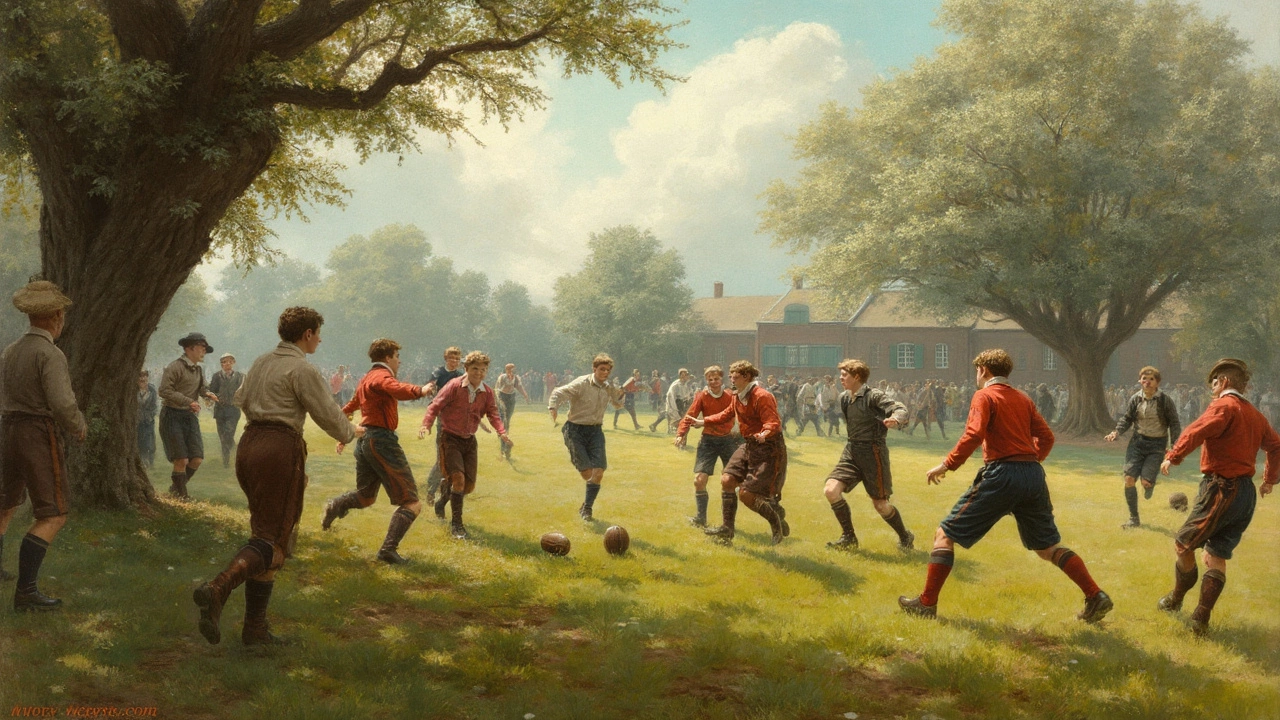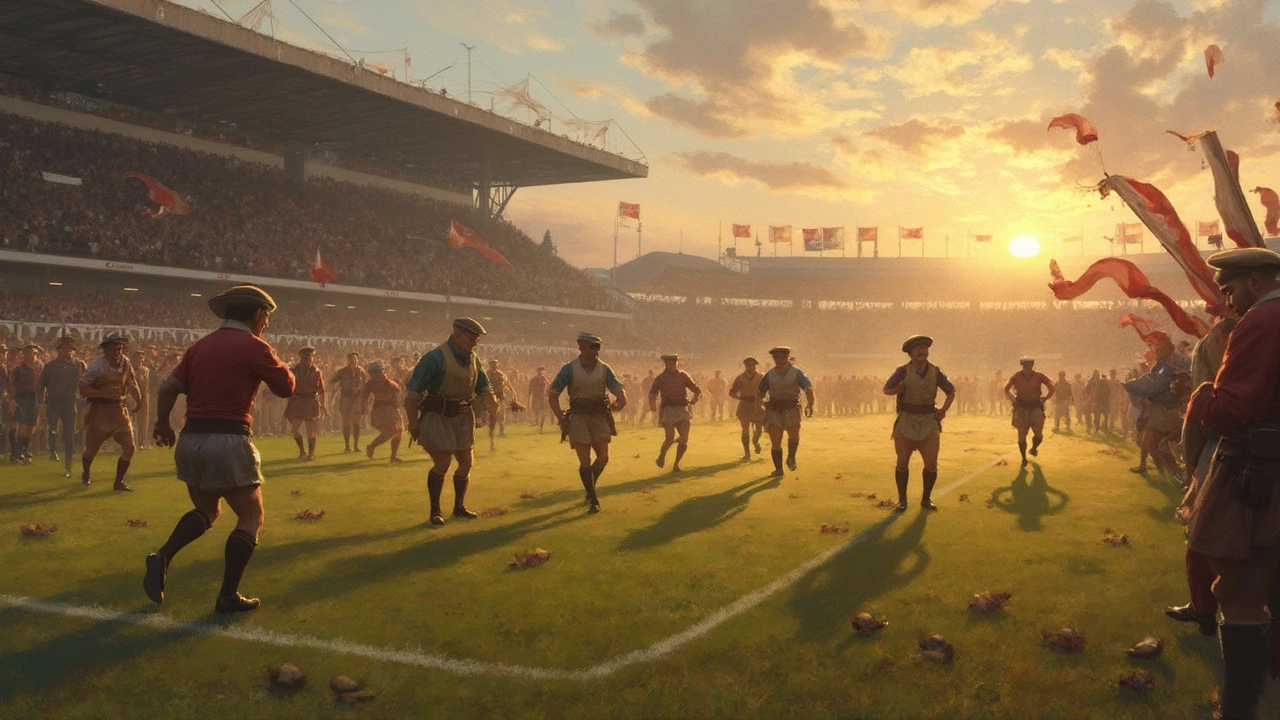
Alright, so you're curious about whether English football or rugby kicked off first, huh? Well, you're not alone. This debate has been like a derby match for history buffs and sports fans alike. Both sports have roots that dig deep into English soil, with a fair bit of scrapping over which one sprinted onto the scene first.
Back in medieval England, folks pretty much played anything that involved a round(ish) object and a goal of some sort. Picture a raucous crowd running through village streets with whatever kind of ball they could get their hands on. Fast forward to the early 1800s, and schools started laying down some rules, and you have the birth of our modern games.
Rugby and football came out of this same chaotic soup. The famous story goes that the split happened when William Webb Ellis picked up a football during a match at Rugby School and ran with it. This little piece of rebel behavior supposedly set the stage for rugby as we know it.
- The Early Days of Ball Games
- The Split: Football vs. Rugby
- Key Moments in Both Sports
- Modern-Day Significance
The Early Days of Ball Games
Way before we had neatly fenced fields and official matches, England was a hotbed for rather chaotic and unregulated ball games. Back in medieval times, pretty much any occasion—or excuse—was a good opportunity for a pig bladder (yep, you read that right) to be kicked around. Villages would challenge each other in boisterous matches, often with more players than spectators, dribbling it through narrow alleys or across open fields.
These early games were not just about scoring goals. Oh no, they were wild and unruly, sometimes resembling a free-for-all. It was the kind of stuff that would make today's referees break out in a cold sweat. The 'rules'? Well, those were pretty much made on the fly, often involving enthusiastic shoving, pushing, and the occasional comic relief when someone's hat went flying off.
By the 19th century, public schools began seeing the value of these games in shaping young boys into strong young men. Different schools developed their own set of rules, which meant that a match played at one school might be quite different from one played at another. Some schools allowed carrying the ball, while others strictly prohibited it. This difference laid the groundwork for the distinctive paths that rugby and English football would eventually take.
Interestingly, the attempt to regulate these games is what eventually led to the formation of structured sports. The need to standardize rules across different schools and towns created the necessity for separate sports, leading to the modern games we know today. So, in those chaotic early games, where the ball was often an afterthought compared to the fun and camaraderie, you can find the true roots of both rugby and English football.
While local customs decided how these games were played, the heart of both rugby and football was beating strongly, ready to take on the world. This foundation of spirited competition lies at the core of today’s high-stakes matches, echoing the raw enthusiasm of early English ball games.
The Split: Football vs. Rugby
Ever wondered how English football and rugby split from the same root to become sworn rivals? Well, the tale traces back to the 19th century when the lines between the two sports weren’t so clear. Schools around England were hotbeds for all kinds of ball games—some favored using your feet, while others didn’t mind picking up the ball every now and then.
The real game-changer came in 1823 at Rugby School. That's where William Webb Ellis, in a match where kicking the ball was the norm, supposedly ignored protocol and sprinted towards the goal with the ball in his hands. From that moment, it sowed the seeds for what would become the game of rugby. As they say in rugby circles, they owe it all “to a boy with a little dash of cheek.”
“In many ways, Rugby School's fields were the crucible where two of the world's most beloved sports crystallized,” wrote sports historian John Bryant.
But it wasn't an overnight split. There was lots of muddling through rules at different schools, making it clear that they needed to sort things out. By 1863, football clubs in London decided enough was enough and formed The Football Association (FA), laying down strict rules against handling the ball. That landmark meeting marked the birth of modern English football.
Rugby, on the other hand, took a more rugged path. Players who loved a good scrum and didn’t want to give up handling the ball stuck to their guns. They eventually codified their own rules, leading to the formation of the Rugby Football Union (RFU) in 1871.
This split wasn’t just about rules. It reflected social divisions too. Football became the sport of the masses, played on muddy fields every week. Rugby, for a while, clung to its public school roots, seen as a game for the elite. Together, these two sports built their separate legacies, but their sibling rivalry remains a fascinating part of their shared history.

Key Moments in Both Sports
Getting down to the nitty-gritty of when English football and rugby really took off, we've got some standout dates and events that shaped these sports into what they are today.
First up, let's talk about 1863. This year was massive because that's when the Football Association (FA) was founded in England. The FA laid down some rules that separated what we know as soccer from rugby. Before this, the two were like squabbling siblings, not quite sure who was who. The creation of the FA marked the official birth of modern football, making those pub arguments about the game's origin way more interesting.
Over on the rugby side, 1871 is a biggie. That's when the Rugby Football Union (RFU) was established. This was like a declaration that rugby was officially its own beast, with a growing number of fans and players eager to see it thrive. And, let’s not forget William Webb Ellis's legendary ball-handling moment in 1823 at Rugby School, which is where rugby supposedly got its quirks.
For a bit of trivia that might win you a pint at the pub: the first international rugby match was played in 1871 between England and Scotland. On the football front, the first international game took place a year later, in 1872, also between England and Scotland.
As you can see, these sports have been kicking and tackling their way through history for quite some time, each carving out their own legendary status with key moments like these. If you're a fan, knowing these sorts of details can make watching the rugby fixtures and football matches even more meaningful.
Modern-Day Significance
Today, English football and rugby have exploded into global phenomena, with each sport holding its unique place in millions of hearts. Let's talk about how big these games have become. Football, or soccer as our friends across the pond call it, commands a fanatical following worldwide. The FIFA World Cup is one of the most-watched sporting events globally, with billions tuning in to catch the action.
Rugby may not have the same widespread appeal as football, but it's huge in certain parts of the world. The Rugby World Cup draws a big crowd, especially from countries that eat, sleep, and breathe rugby, like New Zealand, South Africa, and England. Each World Cup tournament gets bigger, with more teams and audiences every time.
In England, both sports offer more than just entertainment. They're part of the fabric of the culture. From the local pubs where fans gather religiously to watch matches, to the weekends spent cheering on local clubs, these sports bring people together like few others can.
For English football, the English Premier League stands at the pinnacle of excitement and talent. Clubs like Manchester United and Liverpool aren't just football teams; they’re global brands with fans spread far and wide. This league represents the best of the best, and catching a live match at one of these iconic stadiums is often on many a bucket list.
Meanwhile, rugby's impact in the UK and beyond is significant, too. The Six Nations Championship is a yearly must-watch, capturing viewers' imagination across Europe. England’s national team remains a powerhouse, frequently challenging the best in the world.
Here's a snapshot of how these sports stack up in terms of viewership:
| Event | Global Viewership |
|---|---|
| FIFA World Cup Final | Over 1 billion viewers |
| Rugby World Cup Final | About 800 million viewers |
Clearly, both English football and rugby pack a punch on the world stage. Whether you're into the fancy footwork or the bone-crunching tackles, you’ll find a sport here that's hard to ignore.